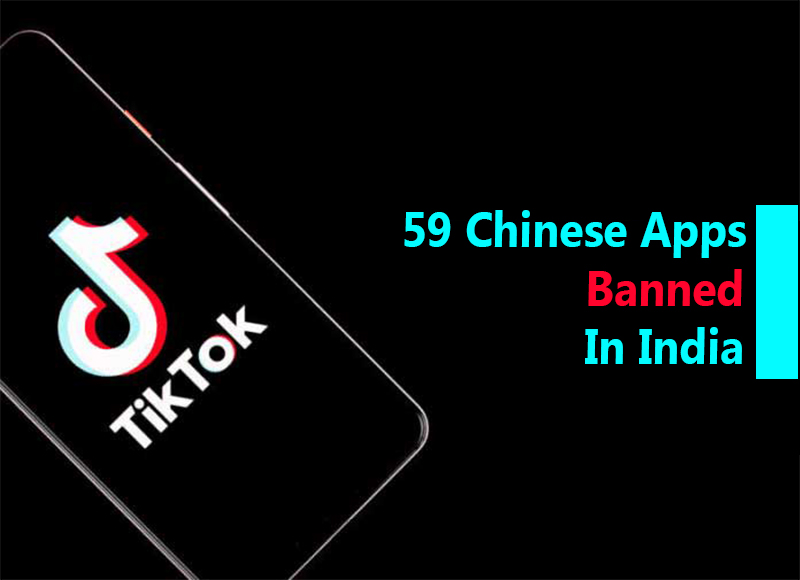
In an unprecedented move, India on 29 of June banned 59 Chinese mobile apps including UC Browser, TikTok, and Cam Scanner among others. A statement from the Indian government said that the applications are “engaged in activities that are damaging to sovereignty and the integrity of India, defense of India, the security of the public and state order”. Although it is accepted that the Centre decided to ban these apps because of the current tensions between China and India at the Line of the Actual Control, the experts retained that even if the relationship with China doesn’t degenerate, these apps shouldn’t have been allowed to use in India.
Apps Banned In India:
- TikTok
- Shareit
- Kwai
- UC Browser
- Baidu map
- Shein
- Clash of Kings
- DU battery saver
- Helo
- Likee
- YouCam makeup
- Mi Community
- CM Browers
- Virus Cleaner
- APUS Browser
- ROMWE
- Club Factory
- Newsdog
- Beauty Plus
- UC News
- QQ Mail
- Sina Weibo
- Xender
- QQ Music
- QQ Newsfeed
- Bigo Live
- SelfieCity
- Mail Master
- Parallel Space
- Mi Video Call – Xiaomi
- WeSync
- ES File Explorer
- Viva Video – QU Video Inc
- Meitu
- Vigo Video
- New Video Status
- DU Recorder
- Vault- Hide
- Cache Cleaner DU App studio
- DU Cleaner
- DU Browser
- Hago Play With New Friends
- Cam Scanner
- Clean Master – Cheetah Mobile
- Wonder Camera
- Photo Wonder
- QQ Player
- We Meet
- Sweet Selfie
- Baidu Translate
- Vmate
- QQ International
- QQ Security Center
- QQ Launcher
- U Video
- V fly Status Video
- Mobile Legends
- DU Privacy
According to an estimate calculation, these Chinese apps earn approx 30-40% of their income from Indian. Famous Chinese app Tik Tok wanted to earn as much as Rs 100 crore from India till September. But the Chinese apps would be a big bump for Beijing’s plan to earn of crore rupees from India. These applications were making the mind of Indian an ideological colony of China. That is the reason that India has made an unprecedented “digital airstrike” on the soft power of China. Just like in 2019, India has responded strongly to Pakistan by the airstrike on Balakot and the Surgical strike in POK in 2016. The actual tribute to the 20 Indian soldiers who were killed in the Galway Valley on the 15th of June is that we now start saying Hindi Chinese Good-Bye in all spheres of life.
China actually wants to expand its organization and business around the world through the Road and Belt Initiative. The countries that participated in this project are really upset today as China is forcing them to pay back their liability. China also wanted to make India a part of this new silk route, but India flatly amalgamated to be a part of this project and now India has also executed an airstrike on the digital silk route of China.
China was intruding not only on the Indian border but also on your mind, your life, and heart with the help of the Internet. You were not only using the mobile applications that are manufactured in China but were also inadvertently dealing with over all your personal information to the Chinese companies and the government. For instance, most of China’s mobile phone apps ask 45% more permission from the consumers than the other apps.
As per the law of China, all companies have to share data with the Chinese Government by the companies controlling these mobile applications. It has been said that the “data will become oil” in the future and the country with more and more data will be the strongest nation. This digital contraction policy China isn’t a threat to countries such as India only from the security point of view, rather it was also damaging local traders and the entrepreneurs.
The invasion of Chinese apps into the mobile app market has enhanced a lot in the last few years. In the case of mobile apps downloads, there were only 18 Chinese apps in the list of top 100 in 2017, but in 2018 the number of Chinese applications in the top 100 list has increased to 44.
It further says that the move to ban these Chinese applications will “protect the interests of crores of Indian mobile as well as the Internet users”. This decision is a targeted move to ensure the sovereignty and safety of Indian cyberspace, it said. It doesn’t come as a surprise since we have seeing tensions between the two countries. As of now, we have reached out to ShareIt and TikTok and a few other brands for a quote on this current situation.







